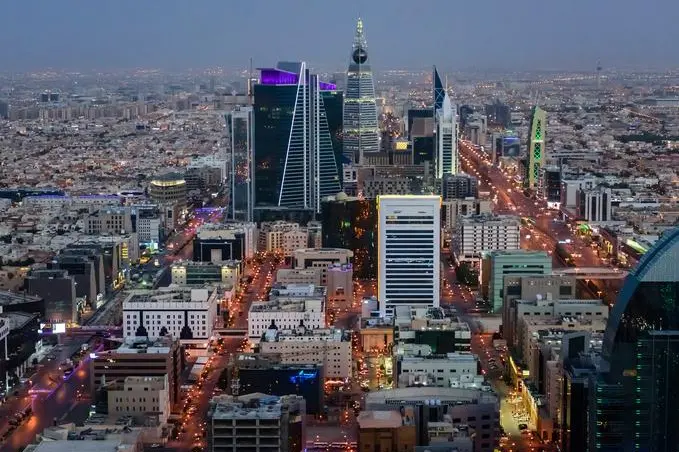PHOTO
A new special economic zone, known as the Integrated Logistics Bonded Zone (ILBZ), is to be established at Riyadh’s King Khalid International Airport, as part of Saudi Arabia’s ambitious plans to become the ‘hub connecting three continents’ – Asia, Europe and Africa.
The new zone, announced by the Saudi Government this week, following a Royal Order issued on Friday, will focus on integrated logistics and will enjoy special rules and regulations aimed at attracting more multinational companies to the kingdom.
The ILBZ was announced on the eve of the Future Investment Initiative conference in Riyadh, at which $50 billion worth of deals were expected to be signed, according to Reuters.
The new bonded zone represents a ‘unique opportunity’ for Saudi Arabia according to Anshu Vats, partner in consultancy firm Oliver Wyman, because of the high levels of consumption in the country, its mature use of transport in heavy industries, which account for 12-15 per cent of its economy, and the country’s favourable links with economies both to the East and West.
“[Saudi Arabia] has a massive demand. The thing about Saudi Arabia is it’s the biggest economy in the region, it’s part of G20, it has 27 million people who are consumers,” Vats said, adding that between 60-70 per cent of shipments into the UAE’s maritime zones are bound for consumption in Saudi Arabia.
“This is an economy that does use transportation in a mature manner, this is also a country that has used other people’s ports for a long period of time, so, having this industry internally and starting to build this capability internally makes imminent sense.”
The new bonded zone will differ from existing port and airport free zones in Jebel Ali, Dubai Airport and Dubai South in the UAE, said Vats, as it has the potential to be an entity for transportation and logistics with ‘discreet’ manufacturing units that will benefit from being within the bonded zone environment, said Vats.
Saudi Arabia does not currently have bonded zones, he said, but uses ports in Jeddah and Dammam as ‘pseudo bonded zones’.
“The goal of the bonded zone is to get to the point where we not only have logistics, we have less hassle of any of the tariff issues, we area also able to do the gross value-add in the local economy, without incurring local taxes or incurring local labour regulations. We can get past some of the local taxation rules because eventually, in a bonded zone, most of it should be export-oriented units.”
As well as freeing up goods passing through the bonded zones from local tariffs, Vats said businesses in the bonded zone had the potential for relief from Nitaqat, or Saudisation, requirements.
“When it goes live, we would like to see some relief from Nitaqat there, because it’s largely export-oriented, and at the end of the day an economic activity has to contribute to the GDP,” he said.
“Employment is one way of generating that impact, export is another, better way of generating that impact. As long as we are doing our bit for generating economic impact, we should not have to contribute to too many buckets at the same time, because that’s when it gets too hard.”
The difference between a free zone and a bonded zone is the depth of the industries involved, he added, referencing companies’ ability to carry out ‘discreet’ manufacturing or value-add activities within the bonded zone, while a free zone is more likely to contain companies operating in an industry in much greater depth, something which can take decades to cultivate.
“If you are talking about a small amount of value-add then you can probably do multiple industries in one place. Most of the bonded zones do that. It’s not a small scale industrial development. You are not creating a whole industry there. What you are doing, for example for pharmaceuticals, is creating a discreet manufacturing facility that does a very small part of value-add there.
The Saudi government press announcement, issued on Monday, said the King Khalid Airport-based facility would focus on a range of activities including warehousing and fulfillment, inventory management, maintenance and repairs, staging, testing, and assembly.
It stated that the ILBZ was part of a broader plan to establish special economic zones in promising locations for different sectors, including ICT, logistics, tourism, industrial and financial services.
The zone will be operated by the General Authority for Civil Aviation (GACA), while the Saudi Arabian General Investment Authority (SAGIA) will be tasked with attracting investment.
(Reporting by Imogen Lillywhite; Editing by Michael Fahy)
(Imogen.lillywhite@refinitiv.com)
Our Standards: The Thomson Reuters Trust Principles
Disclaimer: This article is provided for informational purposes only. The content does not provide tax, legal or investment advice or opinion regarding the suitability, value or profitability of any particular security, portfolio or investment strategy. Read our full disclaimer policy here.
© ZAWYA 2018




















